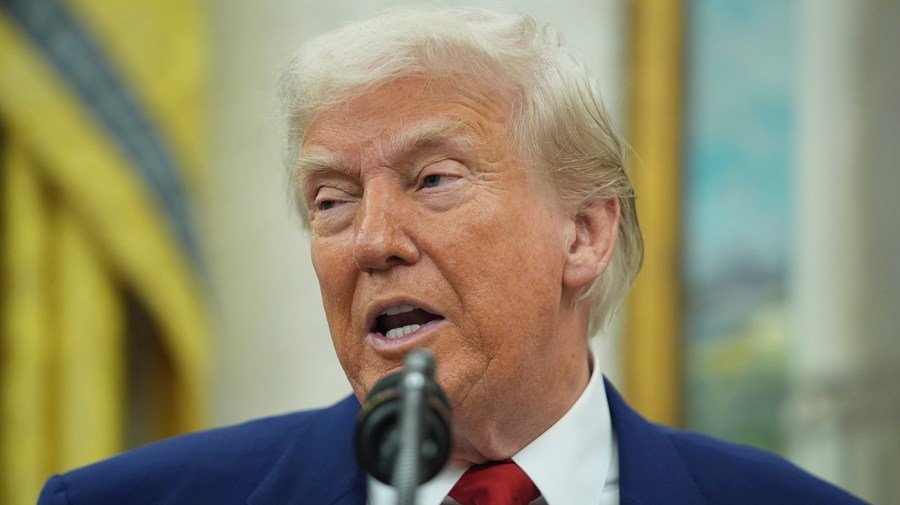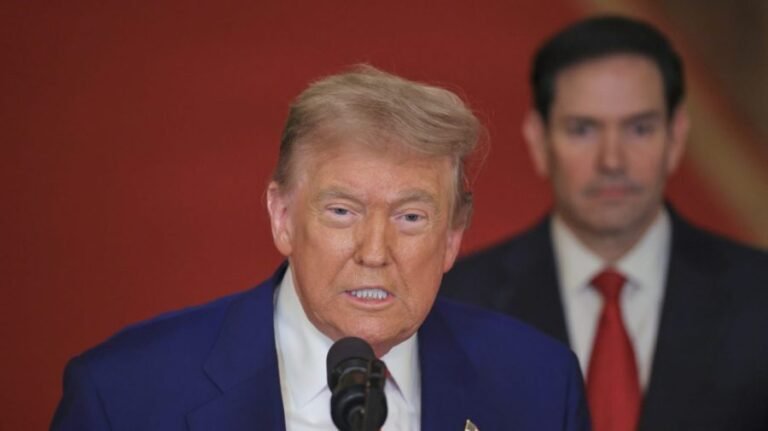
It’s been one year since President Trump was found guilty on all counts of falsifying business records to keep alleged affairs secret during his 2016 campaign, enshrining him in history as the first former commander in chief to be convicted of a felony.
Now back in the White House, his world looks very different — and those who remained by his side have reaped the benefits.
Trump’s defense attorneys are now serving at the Justice Department’s highest levels. His allies who showed up to the trial have been rewarded with Cabinet posts and even the vice presidency.
Trump is also continuing to fight his legal woes, with two major appeals court battles set for June.
Here’s where everything stands one year later.
Trump’s defense lawyers become the prosecution
After retaking the White House, many of Trump’s personal defense attorneys filled top Justice Department positions.
Todd Blanche, Trump’s lead counsel at the hush money trial, serves as deputy attorney general. His right-hand man, Emil Bove, now works as Blanche’s deputy.
The duo has made aggressive moves, including the controversial dismissal of New York City Mayor Eric Adams’s (D) corruption case.
Bove’s tenure at the department may be quickly coming to a close, however. This week, Trump said he was nominating Bove to a judgeship on the U.S. Court of Appeals for the 3rd Circuit.
D. John Sauer, who successfully argued Trump’s presidential immunity claims before the Supreme Court that stymied several of his criminal cases, now spearheads the administration’s efforts at the high court as solicitor general.
Sauer’s office has brought more than a dozen emergency applications to the justices seeking to lift lower court injunctions blocking Trump’s policies.
Meanwhile, Harmeet Dhillon, who supported Trump’s efforts to overturn the 2020 election and represented him in a 14th Amendment challenge to his 2024 candidacy, oversees the Justice Department’s civil rights division. She has reshaped the division’s priorities, causing an exodus of lawyers.
And Alina Habba came to the White House to serve as counselor to the president. Habba, known for her television appearances attacking the cases against Trump, worked on Trump’s civil fraud prosecution brought by the New York attorney general and the defamation cases brought by advice columnist E. Jean Carroll.
In March, Trump named Habba as interim U.S. attorney for New Jersey. In that role, she has brought criminal charges against Rep. LaMonica McIver (D-N.J.) over a scuffle at a Newark immigration facility.
But not all lawyers entered the administration.
Steve Sadow, Trump’s lead counsel in his Georgia criminal case concerning his efforts following the 2020 election, had no interest. Sadow is a longtime Atlanta-based defense attorney who has represented several other prominent clients like Usher and Rick Ross.
“I have never been a prosecutor and never will be. It just not in my makeup,” Sadow said in November after Trump’s election victory.
Trump’s allies rewarded
Trump’s criminal trial became a critical stop for his strongest GOP allies and those vying to join his future administration — and showing up paid off.
Vice President Vance, then a Republican senator for Ohio, joined Trump’s courtroom entourage on the first day of testimony from fixer-turned-foe Michael Cohen. He questioned Cohen’s credibility as a witness on social media, and outside the courthouse, accused the Manhattan prosecutors trying the case of being “Democratic political operatives.”
Then-North Dakota Gov. Doug Burgum (R), who called the proceeding a “scam trial” outside the courthouse, is now Interior secretary.
On Thursday, Trump named Paul Ingrassia, who attended the trial and live tweeted a flood of pro-Trump content, to lead the office charged with prosecuting misconduct in the federal workforce.
And Susie Wiles, who was a senior advisor to Trump’s presidential campaign, attended parts of the trial and was later named his White House chief of staff.
Some Republican allies initially rewarded have ultimately seen those rewards falter.
Trump initially named ex-Rep. Matt Gaetz (R-Fla.) for attorney general, but Gaetz withdrew after it became clear he would not earn enough support in Congress.
Rep. Elise Stefanik (R-N.Y.) was tapped as ambassador to the United Nations, but Trump later asked her to withdraw over fear of losing her congressional seat.
And former presidential candidate-turned-Trump-surrogate Vivek Ramaswamy was set to join the Department of Government Efficiency’s (DOGE) cost-cutting mission alongside billionaire tech mogul Elon Musk but departed to run for governor of Ohio.
Where Trump’s legal troubles stand
Trump’s personal legal woes fell into the background after he became president, but some of his biggest cases are returning to the limelight.
On June 11, Trump’s hush money conviction heads to the U.S. Court of Appeals for the 2nd Circuit for oral arguments.
The president is attempting to move his case out of New York state court — where Trump has long complained he isn’t being treated fairly — and into federal court. If successful, the move would provide Trump a pathway to assert immunity and other defenses that could see his 34-count felony conviction tossed.
Sullivan & Cromwell now helms the president’s defense after many of his mainstay lawyers moved into the Justice Department. The Justice Department is now going to bat for Trump, filing a friend-of-the-court brief backing the president’s position.
“To hold otherwise would risk incentivizing state and local prosecutors to manipulate trial dates and the timing of evidentiary submissions in the most high-profile of cases,” the Justice Department wrote in its brief.
Trump’s attorneys will face off against Manhattan District Attorney Alvin Bragg’s (D) office, which brought the hush money prosecution. The office argues Trump’s bid to move courts is dead now that he’s been sentenced.
Nearly two weeks later, the same court on June 24 will hear Trump’s appeal of a jury’s verdict ordering him to pay $83.3 million to Carroll, the longtime advice columnist who accused Trump of sexually assaulting her in the 1990s.
The Justice Department is attempting to come to Trump’s rescue in that case, too.
In April, the department again asked to substitute the government as the defendant in Carroll’s lawsuit. It had done so at the onset of the case before abandoning the effort in 2023, during the Biden administration.
“I don’t need to tell you that Robbie and I are ready for the fight, do I?” Carroll wrote on Substack last month, referencing her attorney, Robbie Kaplan.
The trial was the second time a jury ordered Trump to pay Carroll. He also was ordered to hand over $5 million in her separate lawsuit, a verdict the 2nd Circuit upheld in December.
And in the state courts in New York, Trump awaits an appeals panel’s decision in its review of the state’s civil fraud case against the now sitting president, which ended in a nearly $500 million judgment against him and his business. The panel heard arguments in September and seemed wary of the massive financial penalty. A decision could come at any time.


